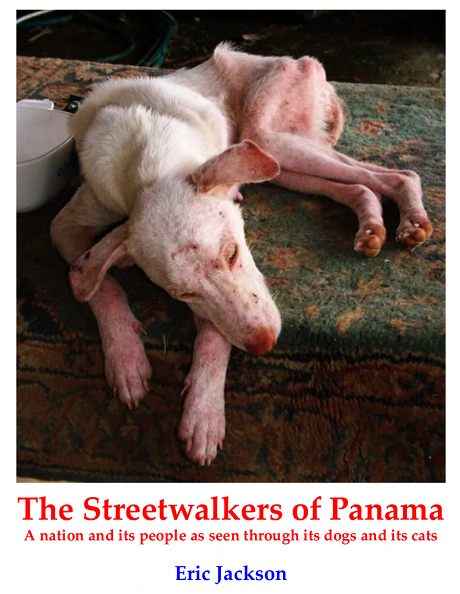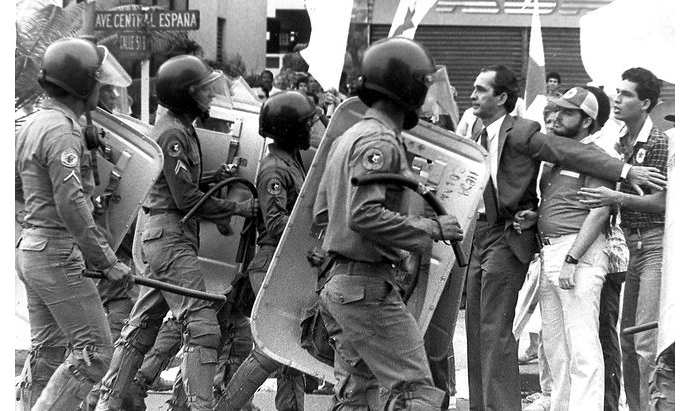Noriega’s Dobermans weren’t actually dogs…. Photo from the Biblioteca Nacional
General Noriega
Mahatma Gandhi once noted that much can be discerned about a society by the way it treats animals. Maybe it’s hypocritical for a guy wearing a leather belt to agree too strongly with this, but nevertheless there is a ring of truth to it.
Perhaps a better measure is the way that a society treats its criminals. THIS Panagringo writer, by birth a citizen of two nations, finds himself at odds with both. One criminal in particular, the late Manuel Antonio Noriega, is an example of this. The man was in his 80s, had spent decades behind bars and along the way was hobbled by a stroke. He fell gravely ill and it became clear that he wouldn’t be making any full recoveries. A decent society lets such an offender out of prison, if only to a hospital bed, to spend his last days with family, friends or just hospital staff whose mission is not punitive. Anyway, that’s how this reporter sees it.
In the end Panama let its former dictator go to a civilian hospital, but many Panamanians objected.
Almost any Panamanian above a certain age could be said that be one of Noriega’s victims. He led the country through hell and more than once suppressed the majority of voters who didn’t want to go there. (The Panamanians who were his ACCOMPLICES almost never admit it, but there were an awful lot of those, too.)
Could he try to shift blame? He could and he did. Set aside the “true reason” for the years of economic strangulation that preceded the 1989 US invasion and you’d have to be petty to deny that the suffering that flowed from the sanctions was externally imposed. That was his argument. He blamed a civilian informant for the death in government custody of Father Héctor Gallego, the Catholic parish priest in Santa Fe de Veraguas. Having concealed evidence, he left his accusers to their proofs with respect to people trying to overthrow him whom he had fairly obviously had killed. His apologists noted that in most places those who try to overthrow the government by force of arms or by acting in concert with a foreign power risk being killed for this.
Two staples of gringo popular culture with respect to guys who have people killed are:
1. “He has forfeited his life. Why should money be wasted on feeding him? Execute him.” and
2. “Lock him up and throw away they key.”
In US politics more people in prison serving longer sentences under more brutal conditions has very often been a winning election platform. Only in relatively recent times, after a long experiment that was largely conducted under the guise of “The War on Drugs,” have many Americans looked around and, whatever their opinion of the justice or injustice of it all, noticed that it was both expensive and ineffective.
And your “law and order conservatives?” Often mere racists. Often professing to be devout Christians, who more often than not haven’t much read the Bible. Often devotees of a strange put popular secular religion that treats the US Constitution as a sacred text, although by and large they haven’t read that, either. But there, among the first 10 amendments, one will find a ban on “cruel and unusual” punishments.
Like insisting that a crippled old man who did terrible things die in a cage? You won’t find debate notes or 18th century historical practices to argue that the authors of the Bill of Rights specifically meant to prohibit that. Within modern international standards the general opinion would be that such stuff is cruel and unusual, notwithstanding the contrary practices of a few notorious countries.
Noriega was let out of prison but never went home. He died in a hospital bed with family members at his side.
Most Americans who would have preferred a maximum of suffering imposed on the person of Manuel Antonio Noriega don’t actually know very much about what he did.
Yes, he turned a blind eye toward cocaine smuggling via Panama at a time when US operatives were engaged in this to raise money to arm the Nicaraguan Contras. He let some others do that, too. He was not a drug dealer himself.
No, he did not declare war on the United States. He did, however, see it coming. If he prepared by passing out assault rifles to his Dignity Battalions militia, the main effect of this was a massive post-invasion crime wave. Men with AK-47s descending on upscale restaurants and robbing everyone on the premises became a feature of those immediate post-Noriega times.
But then, the gringo side of this reporter is impressed – not in a positive way — with a certain quirk about how most Panamanians view the legacy of Manuel Antonio Noriega. Ask the strongest critics of the former strongman to enumerate his crimes, ask those Panamanians who were offended that he didn’t die in prison, and one count is almost always missing.
Here was a soldier – a general – who deserted his post under fire.
Anyone who loves and understands dogs for their best qualities would see the contrast. Instead of a “maximum leader” who when in power had difficulty distinguishing himself from God, wouldn’t most Panamanians have been better served by a leader who was as loyal to them as their dogs are?

These links are interactive — click on the boxes













